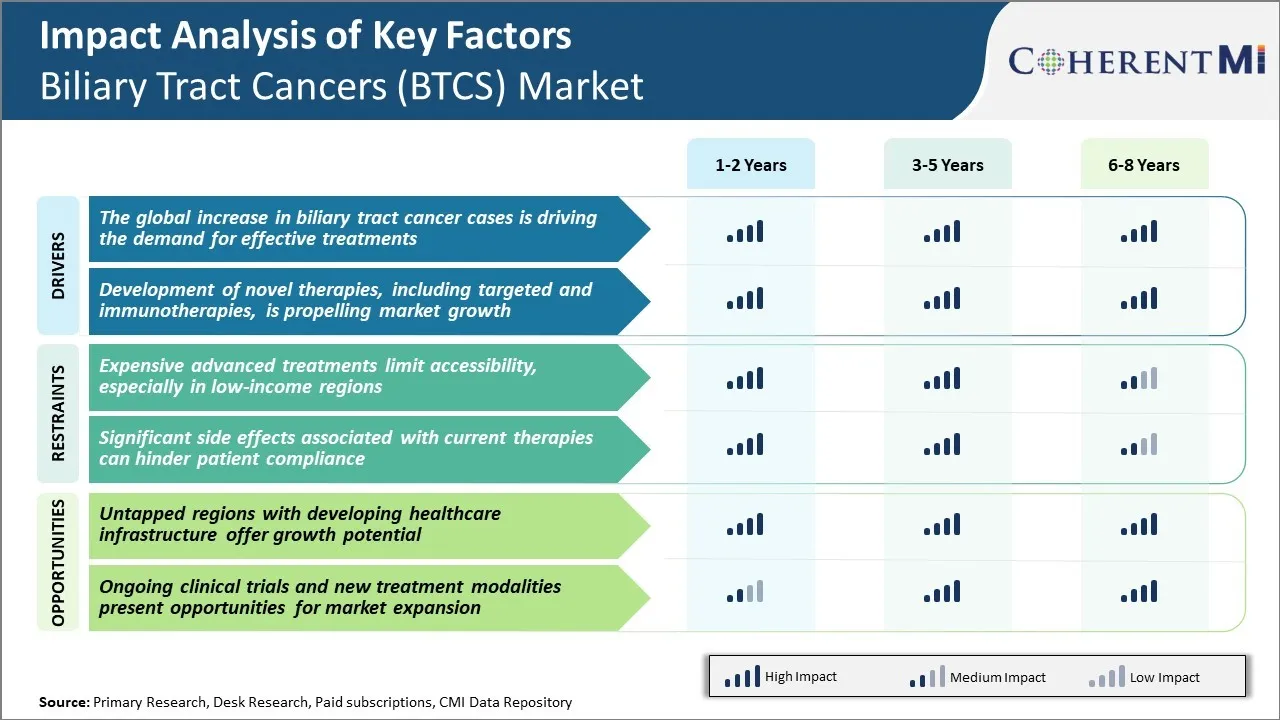Biliary Tract Cancers (BTCs) Market Trends
Market Driver - Global Increase in Biliary Tract Cancer Cases is Driving the Demand for Effective Treatments
The prevalence of biliary tract cancers has been rising steadily worldwide over the past few decades. While these cancers remain relatively rare compared to other cancers, the global disease burden has increased significantly.
According to estimates from the American Cancer Society, over 8,000 new cases of biliary tract cancers were diagnosed in the US alone in 2020. Biliary tract cancers are typically detected at advanced stages making them difficult to treat.
With limited treatment options available till recently, outcomes were especially poor with a low 5-year survival rate of less than 15%.
Currently, chemotherapy either alone or in combination with radiation remains the mainstay of initial treatment despite its limitations like low response rates and high toxicity. Clearly, there is an urgent unmet need for newer drugs that can improve clinical outcomes for biliary tract cancer patients.
The huge clinical opportunity is a major factor motivating increased R&D investments from pharmaceutical companies in this space. With several candidates under development and evaluation in ongoing clinical trials, it seems this demand for better options will help drive robust market growth in the coming years.
Market Driver - Development of Novel Therapies is Propelling Market Growth
Given the poor prognosis of biliary tract cancers, developers have intensified their efforts in recent times to develop newer therapeutic alternatives beyond chemotherapy. Significant advances are being made in understanding the molecular pathogenesis of these cancers which is aiding the discovery and design of targeted drugs attack specific genetic anomalies driving tumor growth. Several targeted agents targeting common mutations and signaling pathways deregulated in biliary cancers have shown promise in early clinical research.
Separately, researchers are also exploring immunotherapy approaches featuring checkpoint inhibitors and other immune modulators. Preliminary evidence suggests biliary cancers may be amenable to immunotherapies, though more research is still needed.
Overall, this unprecedented level of therapeutic innovation is helping transform the treatment landscape. A diverse pipeline of novel drug molecules spanning targeted therapies and immunotherapies is advancing robustly towards clinics. Their proven efficacy, even if for select patient groups initially, could greatly expand the addressable patient population.
This would then present pharmaceutical companies opportunities for multiple new product approvals and sustained growth in the years to come. Novel therapies also allow scope for combination regimens and sequence therapies further improving outcomes. Such advancement will undoubtedly buoy the commercial attractiveness of this market.

Market Challenge - Expensive Advanced Treatments Limit Accessibility, Especially in Low-income Regions
One of the main challenges affecting the Biliary Tract Cancers (BTCs) Market is the high cost of advanced treatments which consequently limits their accessibility, particularly in low-income regions. Treating BTCs requires specialized surgery along with chemotherapy and radiation therapy in many cases. While these treatments have improved survival rates and outcomes for BTC patients, the associated medical costs are quite steep.
For instance, the average cost of Whipple procedure, one of the major surgeries for BTCs, ranges between $30,000 to $150,000 in the United States. Similarly, newer targeted drugs and immunotherapy options that are proving effective also have sizable price tags. This makes advanced care unaffordable for many patients from underdeveloped or developing areas with low average income-levels and limited public health coverage.
As a result, patients in low-resource settings often resort to best-available but less effective options due to financial constraints, negatively impacting the overall market potential. Lack of funding remains a major barrier that needs to be addressed to ensure more inclusive access to optimal BTC treatment approaches worldwide.
Market Opportunity - Untapped Regions with Developing Healthcare Infrastructure Offer Growth Potential for Market
One significant opportunity for the Biliary Tract Cancers (BTCs) market lies in targeting the expanding patient demographic in regions witnessing economic development and improvements in healthcare provision. Parts of Asia, Latin America, Eastern Europe, and Africa are seeing growing per capita incomes as well as government investments in public health programs. This is leading to enhanced medical insurance coverage and access to sophisticated cancer diagnostics and management technologies in these previously underserved areas.
As the diagnostic and treatment capabilities increase at local hospitals and cancer centers, more BTC cases are being identified and referred to specialized care. Furthermore, with greater affordability of quality care, patients are opting for recommended guideline-based standard of care instead of compromising on treatment.
The market players can leverage this emerging opportunity by tailored engagement strategies, such as partnerships, licensing models and other collaborations, to expand access to their BTC product portfolios into these untapped global markets with burgeoning healthcare infrastructure and seeking advanced solutions.